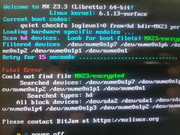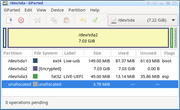Not so fast. I next copied the three relevant files (vmlinuz, initrd.gz and linuxfs) to the existing MX23 frugal install (with the old kernel) on the SP4. vmlinuz and initrd.gz sit on the EFI partition in /MX23 (plus the "encrypted" file with the UUID of the encrypted partition). The new linuxfs goes into /MX23 on the encrypted partition. I double-checked everything and re-booted. Or rather, didn't as the boot broke off with the message that "MX23/encrypted" can't be found on any searched device. Among the searched devices is /dev/nvme0n1p1, the one with all EFI files and with vmlinuz, initrd.gz and encrypted in /MX23.
So I rebooted with "bp=3" and a quick "cat /dev/nvme0n1p" showed that this exists and can be read. I normally use rEFInd but also tried grub2, won't boot either. So, I am stumped.
A quick recap. The original MX23 install on the SP4 SSD with the old kernel was encrypted, booted OK from the SSD and worked but w/o touch. The encrypted USB stick (with the new kernel) boots perfectly OK and also works, including the touch screen. The exact same three files when copied from the USB to the exact same locations on the SSD do not boot because MX23/encrypted can't be found (I triple checked that the files are indeed the same, including md5sum).
I have no idea whatever I could try next.
The QSI is the booting old version.
Code: Select all
Snapshot created on: 20240213_1535
System:
Kernel: 6.1.0-18-amd64 [6.1.76-1] arch: x86_64 bits: 64 compiler: gcc v: 12.2.0 parameters: quiet checkfs
loglevel=0 from=hd bdir=MX23 hostname=msp4mx persist=root!,home! initrd=MX23\initrd.gz
Desktop: Xfce v: 4.18.1 tk: Gtk v: 3.24.36 info: xfce4-panel wm: xfwm v: 4.18.0 vt: 7
dm: LightDM v: 1.32.0 Distro: MX-23.3_x64 Libretto February 16 2024 base: Debian GNU/Linux 12
(bookworm)
Machine:
Type: Laptop System: Microsoft product: Surface Pro 4
v: 124000000000000000000000D:0B:08F:1C:03P:38 serial: <superuser required> Chassis: type: 9
serial: <superuser required>
Mobo: Microsoft model: Surface Pro 4 serial: <superuser required> UEFI: Microsoft
v: 109.3748.768 date: 05.04.2021
Battery:
ID-1: BAT1 charge: 23.3 Wh (65.6%) condition: 35.5/38.2 Wh (93.1%) power: 18.9 W volts: 7.4
min: 7.5 model: DYN X910528 type: Li-ion serial: <filter> status: discharging cycles: 61
CPU:
Info: model: Intel Core i5-6300U bits: 64 type: MT MCP arch: Skylake gen: core 6 level: v3
note: check built: 2015 process: Intel 14nm family: 6 model-id: 0x4E (78) stepping: 3
microcode: 0xEA
Topology: cpus: 1x cores: 2 tpc: 2 threads: 4 smt: enabled cache: L1: 128 KiB
desc: d-2x32 KiB; i-2x32 KiB L2: 512 KiB desc: 2x256 KiB L3: 3 MiB desc: 1x3 MiB
Speed (MHz): avg: 725 high: 777 min/max: 400/3000 scaling: driver: intel_pstate
governor: powersave cores: 1: 725 2: 700 3: 777 4: 700 bogomips: 19999
Flags: avx avx2 ht lm nx pae sse sse2 sse3 sse4_1 sse4_2 ssse3 vmx
Vulnerabilities:
Type: gather_data_sampling status: Vulnerable: No microcode
Type: itlb_multihit status: KVM: VMX disabled
Type: l1tf mitigation: PTE Inversion; VMX: conditional cache flushes, SMT vulnerable
Type: mds mitigation: Clear CPU buffers; SMT vulnerable
Type: meltdown mitigation: PTI
Type: mmio_stale_data mitigation: Clear CPU buffers; SMT vulnerable
Type: retbleed mitigation: IBRS
Type: spec_rstack_overflow status: Not affected
Type: spec_store_bypass mitigation: Speculative Store Bypass disabled via prctl
Type: spectre_v1 mitigation: usercopy/swapgs barriers and __user pointer sanitization
Type: spectre_v2 mitigation: IBRS, IBPB: conditional, STIBP: conditional, RSB filling,
PBRSB-eIBRS: Not affected
Type: srbds mitigation: Microcode
Type: tsx_async_abort mitigation: TSX disabled
Graphics:
Device-1: Intel Skylake GT2 [HD Graphics 520] vendor: Microsoft driver: i915 v: kernel
arch: Gen-9 process: Intel 14n built: 2015-16 ports: active: eDP-1 empty: DP-1, DP-2, HDMI-A-1,
HDMI-A-2 bus-ID: 00:02.0 chip-ID: 8086:1916 class-ID: 0300
Display: x11 server: X.Org v: 1.21.1.7 compositor: xfwm v: 4.18.0 driver: X:
loaded: modesetting unloaded: fbdev,vesa dri: iris gpu: i915 display-ID: :0.0 screens: 1
Screen-1: 0 s-res: 1710x1140 s-dpi: 96 s-size: 451x301mm (17.76x11.85") s-diag: 542mm (21.35")
Monitor-1: eDP-1 model: Samsung 0x3853 built: 2015 res: 1710x1140 hz: 60 dpi: 167 gamma: 1.2
size: 260x173mm (10.24x6.81") diag: 312mm (12.3") ratio: 3:2 modes: 2736x1824
API: OpenGL v: 4.6 Mesa 22.3.6 renderer: Mesa Intel HD Graphics 520 (SKL GT2)
direct-render: Yes
Audio:
Device-1: Intel Xeon E3-1200 v5/E3-1500 v5/6th Gen Core Processor Imaging Unit driver: N/A
bus-ID: 00:05.0 chip-ID: 8086:1919 class-ID: 0480
Device-2: Intel CSI-2 Host driver: N/A bus-ID: 00:14.3 chip-ID: 8086:9d32 class-ID: 0480
Device-3: Intel Sunrise Point-LP HD Audio driver: snd_hda_intel v: kernel
alternate: snd_soc_skl,snd_sof_pci_intel_skl bus-ID: 00:1f.3 chip-ID: 8086:9d70 class-ID: 0403
API: ALSA v: k6.1.0-18-amd64 status: kernel-api tools: alsactl,alsamixer,amixer
Network:
Device-1: Marvell 88W8897 [AVASTAR] 802.11ac Wireless driver: mwifiex_pcie v: 1.0 pcie: gen: 1
speed: 2.5 GT/s lanes: 1 bus-ID: 02:00.0 chip-ID: 11ab:2b38 class-ID: 0200
IF: mlan0 state: up mac: <filter>
Bluetooth:
Device-1: Marvell Bluetooth and Wireless LAN Composite driver: btusb v: 0.8 type: USB rev: 2.0
speed: 480 Mb/s lanes: 1 mode: 2.0 bus-ID: 1-5:5 chip-ID: 1286:204c class-ID: e001
serial: <filter>
Report: hciconfig ID: hci0 rfk-id: 1 state: down bt-service: N/A rfk-block: hardware: no
software: no address: <filter>
Info: acl-mtu: 1021:7 sco-mtu: 240:3 link-policy: rswitch hold sniff
link-mode: peripheral accept
Drives:
Local Storage: total: 357.54 GiB used: 8.55 GiB (2.4%)
SMART Message: Unable to run smartctl. Root privileges required.
ID-1: /dev/nvme0n1 maj-min: 259:0 vendor: Samsung model: MZFLV128HCGR-000MV size: 119.24 GiB
block-size: physical: 512 B logical: 512 B speed: 31.6 Gb/s lanes: 4 tech: SSD serial: <filter>
fw-rev: BXV75M0Q temp: 34.9 C scheme: GPT
ID-2: /dev/sda maj-min: 8:0 vendor: Generic model: USB3.0 CRW -SD size: 238.3 GiB block-size:
physical: 512 B logical: 512 B type: USB rev: 3.0 spd: 5 Gb/s lanes: 1 mode: 3.2 gen-1x1
tech: N/A serial: <filter> fw-rev: 1.00 scheme: GPT
SMART Message: Unknown USB bridge. Flash drive/Unsupported enclosure?
Partition:
Message: No partition data found.
Swap:
Alert: No swap data was found.
Sensors:
System Temperatures: cpu: 41.0 C pch: 37.5 C mobo: N/A
Fan Speeds (RPM): N/A
Repos:
Packages: pm: dpkg pkgs: 1885 libs: 961 tools: apt,apt-get,aptitude pm: rpm pkgs: 0 pm: flatpak
pkgs: 0
No active apt repos in: /etc/apt/sources.list
Active apt repos in: /etc/apt/sources.list.d/debian-stable-updates.list
1: deb http://deb.debian.org/debian bookworm-updates main contrib non-free non-free-firmware
Active apt repos in: /etc/apt/sources.list.d/debian.list
1: deb http://deb.debian.org/debian bookworm main contrib non-free non-free-firmware
2: deb http://security.debian.org/debian-security bookworm-security main contrib non-free non-free-firmware
Active apt repos in: /etc/apt/sources.list.d/mx.list
1: deb http://mxrepo.com/mx/repo/ bookworm main non-free
Active apt repos in: /etc/apt/sources.list.d/vivaldi.list
1: deb [arch=amd64] https://repo.vivaldi.com/stable/deb/ stable main
Info:
Processes: 216 Uptime: 1m wakeups: 3 Memory: total: 4 GiB available: 3.75 GiB
used: 2.75 GiB (73.3%) Init: SysVinit v: 3.06 runlevel: 5 default: graphical tool: systemctl
Compilers: gcc: 12.2.0 alt: 12 Client: shell wrapper v: 5.2.15-release inxi: 3.3.28
Boot Mode: UEFI

